| Written by: | Stephanie Milsom |
| Date posted: | November 7, 2022 |
| Posted in: | Home / Information / |
Language Levels
 All our schools offer classes at a range of language levels, most according to the Common European Framework of Reference for languages (CEFR).
All our schools offer classes at a range of language levels, most according to the Common European Framework of Reference for languages (CEFR).
The CEFR framework below outlines the following categories or levels of language users.
Whether you have zero experience learning the language of your choice, you know a bit, or you’re already a pro, we’ve got the course for you!
A0: Absolute beginner: Has no experience of learning the language in any capacity.
A: Basic user. Has some knowledge but struggles to hold a conversation or recognise more complex vocabulary. This section is split into A1 – Breakthrough (false beginner) and A2 – Waystage (elementary).
B: Independent user. Can hold relatively complex conversations and is familiar with more complex vocabulary. This section is split into B1 – Threshold (low intermediate) and B2 – Vantage (upper intermediate).
C: Proficient user. Is fluent, or very nearly fluent. This section is split into C1 – Effective Operation Proficiency (advanced) and C2 – Mastery (fluent).
This table goes into more detail about the specific skills required for each level over all the core language skills (speaking, listening, reading, and writing):
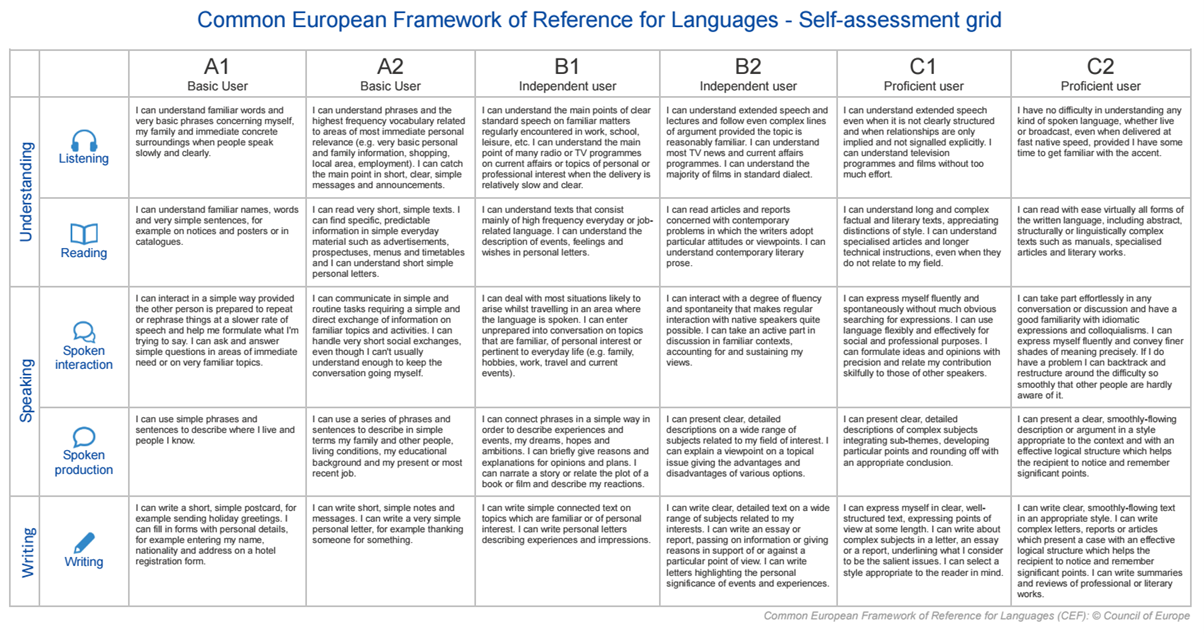
If you’re not sure what your starting level is, don’t worry. Whatever programme you select at whichever of our schools, you’ll be assessed prior to beginning your course. This allows the staff at the school to get a good gauge of your starting ability level so they can place you in a group with other students of a similar level. This methodology means all students learn at an appropriate pace – no one is left behind or stuck feeling bored!
In most of our schools, complete beginners (A0) need to start their course on a specific beginners’ date, while anyone with at least A1 experience can begin their course on any Monday*. Some schools accept all levels on Mondays, and some schools require A1 students (‘false beginners’) to start on set dates, too. You should be sure to book your course for the right date! If you’re unsure about this, contact us right away and we’ll be happy to help.
*Not applicable to specialist courses, which are often scheduled to start on set dates.
Language levels and progression
The length of time required to complete one level ranges depending on the language you’re studying. To a large extent, it also depends on what your mother tongue is. For example, a Dutch national wouldn’t need as long to study German as their French, Spanish, or Chinese counterparts, since the two languages are closely related. That same Dutch national would, however, likely need longer to progress in Japanese than the Chinese counterpart, because Mandarin and Japanese share similar writing systems.
There is, however, a general estimate of hours needed for the average student to progress through their language tuition by one level. This information is based on data from our schools for students studying 20 hours per week in an immersive group environment. The specific duration you require for your language course may vary.
Please find below the average estimate for the number of weeks it takes to progress by one level per language.
Arabic language levels
| Level | A0 – A1 | A1 – A2 | A2 – B1 | B1 – B2 | B2 – C1 | C1 – C2 | Total |
| Weeks | 4 | 4 | 4 | 4 | 4 | 4 | 24 |
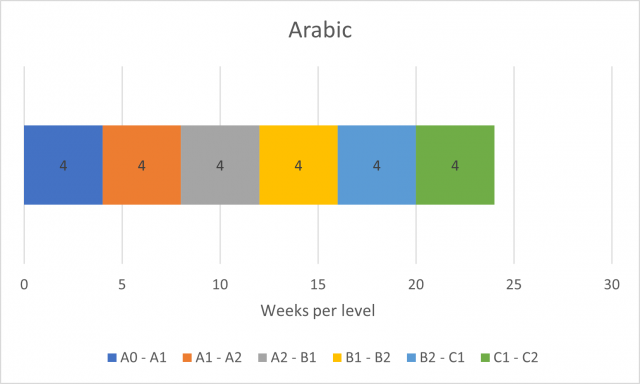
Chinese language levels
Note: Chinese proficiency is measured across HSK levels 1 – 6. We have used the CEFR below as a guide only.
| Level | A0 – A1 | A1 – A2 | A2 – B1 | B1 – B2 | B2 – C1 | C1 – C2 | Total |
| Weeks | 5 | 5 | 5 | 5 | 5 | 5 | 30 |
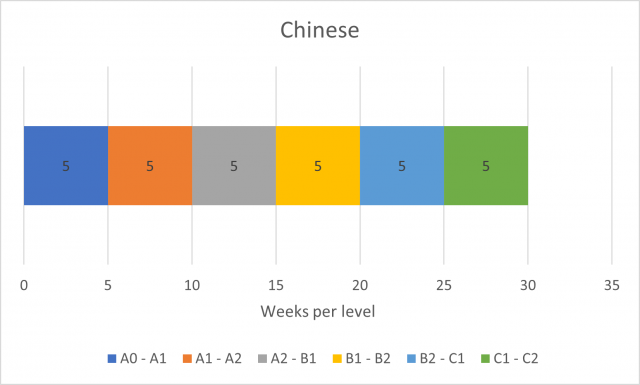
English language levels
| Level | A0 – A1 | A1 – A2 | A2 – B1 | B1 – B2 | B2 – C1 | C1 – C2 | Total |
| Weeks | 5 | 9 | 9 | 16 | 13 | 14 | 66 |
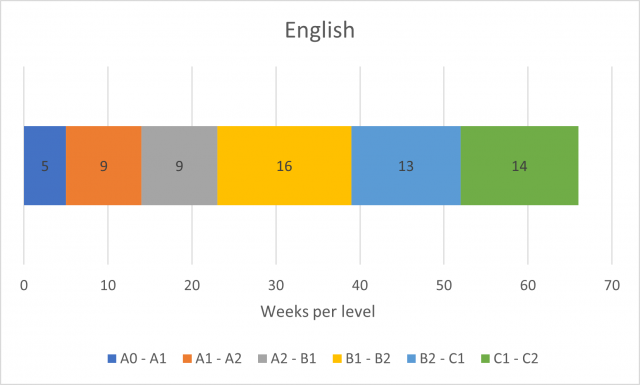
English language assessment grid
French language levels
| Level | A0 – A1 | A1 – A2 | A2 – B1 | B1 – B2 | B2 – C1 | C1 – C2 | Total |
| Weeks | 7 | 8 | 9 | 10 | 11 | 12 | 57 |
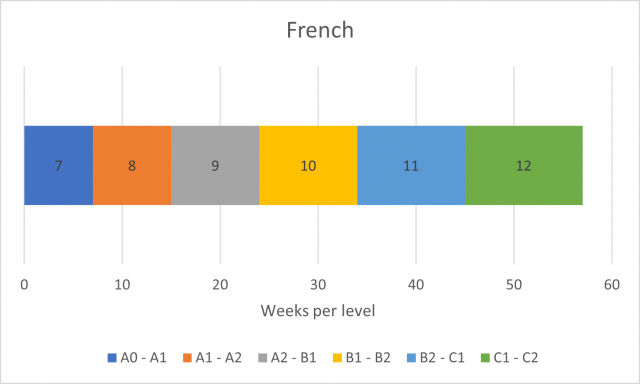
French language assessment grid
German language levels
| Level | A0 – A1 | A1 – A2 | A2 – B1 | B1 – B2 | B2 – C1 | C1 – C2 | Total |
| Weeks | 8 | 8 | 8 | 8 | 8 | 8 | 48 |
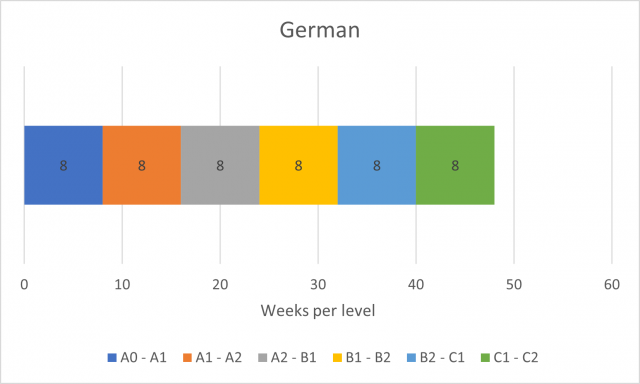
German language assessment grid
Greek language levels
| Level | A0 – A1 | A1 – A2 | A2 – B1 | B1 – B2 | B2 – C1 | C1 – C2 | Total |
| Weeks | 4 | 4 | 4 | 4 | 4 | 4 | 24 |
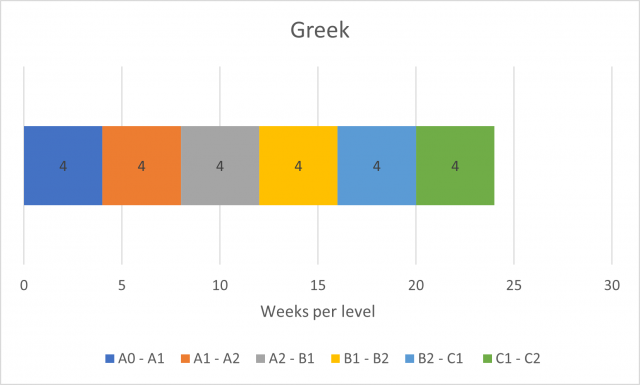
Greek language assessment grid
Italian language levels
| Level | A0 – A1 | A1 – A2 | A2 – B1 | B1 – B2 | B2 – C1 | C1 – C2 | Total |
| Weeks | 5 | 7 | 8 | 8 | 8 | 9 | 45 |
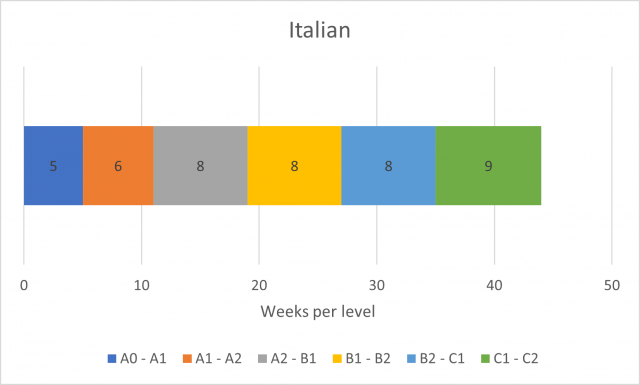
Italian language assessment grid
Japanese language levels
Note: Japanese proficiency is measured across levels 1, 2, 3, 4, and 5. We have used the CEFR below as a guide only.
| Level | A0 – A1 | A1 – A2 | A2 – B1 | B1 – B2 | B2 – C1 | C1 – C2 | Total |
| Weeks | 14 | 15 | 8 | 23 | 12 | 10 | 82 |
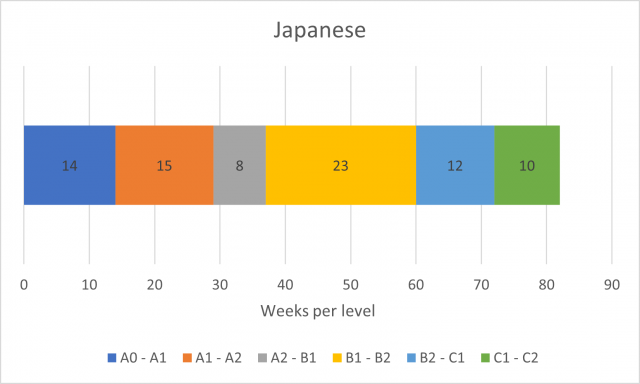
Polish language levels
| Level | A0 – A1 | A1 – A2 | A2 – B1 | B1 – B2 | B2 – C1 | C1 – C2 | Total |
| Weeks | 6 | 6 | 6 | 12 | 4 | 4 | 38 |
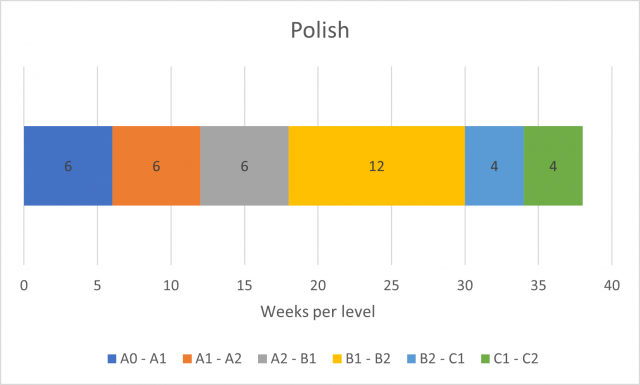
Polish language assessment grid
Portuguese language levels
| Level | A0 – A1 | A1 – A2 | A2 – B1 | B1 – B2 | B2 – C1 | C1 – C2 | Total |
| Weeks | 4 | 4 | 6 | 6 | 8 | 8 | 36 |
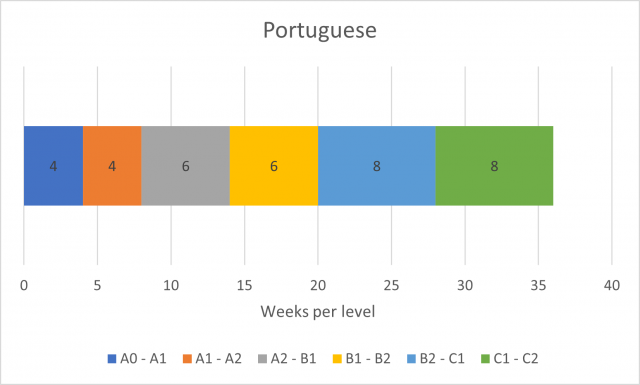
Portuguese language assessment grid
Russian language levels
| Level | A0 – A1 | A1 – A2 | A2 – B1 | B1 – B2 | B2 – C1 | C1 – C2 | Total |
| Weeks | 6 | 9 | 15 | 17 | 14 | 17 | 75 |
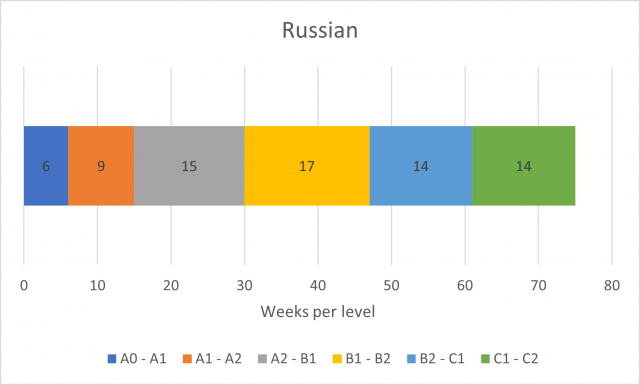
Russian language assessment grid
Spanish language levels
| Level | A0 – A1 | A1 – A2 | A2 – B1 | B1 – B2 | B2 – C1 | C1 – C2 | Total |
| Weeks | 4 | 5 | 7 | 9 | 10 | 10 | 45 |
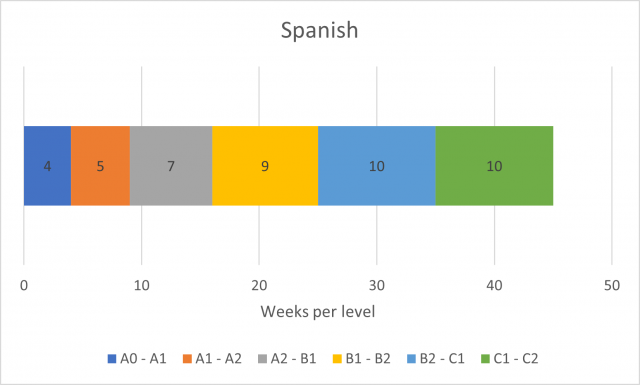
Spanish language assessment grid
REMEMBER: there are various factors affecting your progression. These include practical things like how much time you can dedicate to extra-curricular study and how much exposure and practice you get outside the classroom, as well as more abstract things like how you learn and whether you are naturally disposed to language learning.
Things you can do to increase your rate of progression:
- ensuring you continue using the language at all times outside the classroom (even if it feels difficult at first!);
- watching television and movies in the language;
- listening to songs, the radio, and podcasts in the language;
- reading books and magazines in the language;
- staying with a local homestay host to guarantee additional language practice with a native speaker;
- booking a more rigorous course, such as a Super-intensive programme, private tuition, or a combined package (see Our Courses for more information);
- exploring the location to get as much language exposure as possible, and trying to speak to as many people as possible while you do so to get extra language practice.
If you’re still unsure about how much tuition to book, or have questions about your planned language course, feel free to contact us at any time. You can call our offices on (+44) 1509 211 612 or email info@applelanguages.com. You can also fill in our web form or use our LiveChat function, and one of our dedicated team members will be in touch with you as soon as possible.

Blog Categories
- Activities (4)
- Yoga (1)
- Christmas Courses (17)
- Food (21)
- Recipes (4)
- Information (83)
- Instagram (11)
- Language fun (11)
- My travel journal (15)
- Sample Programmes (2)
- Video Guides (11)
- Locations (430)
- America (4)
- Argentina (15)
- Bariloche (4)
- Buenos Aires (8)
- Cordoba (2)
- Mendoza (1)
- Australia (1)
- Sydney (1)
- Austria (4)
- Brazil (5)
- Maceio (2)
- Salvador da Bahia (2)
- Sao Paulo (1)
- Canada (8)
- Chile (4)
- China (7)
- Colombia (2)
- Costa Rica (8)
- Flamingo Beach (5)
- Monteverde (1)
- Cuba (8)
- Havana (3)
- Santiago de Cuba (3)
- Trinidad (2)
- Czech Republic (2)
- Prague (2)
- Dominican Republic (1)
- Santo Domingo (1)
- Ecuador (3)
- Egypt (2)
- Cairo (2)
- England (23)
- Bournemouth (1)
- Brighton (1)
- Bristol (1)
- Cambridge (2)
- Liverpool (9)
- London (3)
- Manchester (2)
- Oxford (1)
- Portsmouth (1)
- France (53)
- Germany (49)
- Greece (4)
- Guadeloupe (3)
- Guatemala (2)
- Antigua (2)
- Ireland (4)
- Italy (78)
- Japan (3)
- Latvia (1)
- Riga (1)
- Malta (3)
- Mexico (10)
- Cuernavaca (1)
- Guadalajara (1)
- Guanajuato (1)
- Mexico City (1)
- Playa del Carmen (6)
- Morocco (1)
- Rabat (1)
- Netherlands (4)
- Panama (1)
- Bocas del Toro (1)
- Boquete (1)
- Peru (5)
- Poland (2)
- Portugal (9)
- Russia (6)
- Moscow (2)
- St Petersburg (2)
- Scotland (2)
- Edinburgh (2)
- Spain (89)
- Alicante (1)
- Barcelona (13)
- Bilbao (1)
- Cadiz (1)
- Costa Adeje (1)
- El Puerto (3)
- Granada (5)
- Ibiza (1)
- Lanzarote (1)
- Madrid (6)
- Malaga (15)
- Marbella (1)
- Murcia (1)
- Nerja (4)
- Pamplona (1)
- Puerto de la Cruz (3)
- Salamanca (3)
- San Sebastian (7)
- Santiago de Compostela (2)
- Seville (5)
- Tenerife (6)
- Valencia (9)
- Vejer de la Frontera (2)
- Sweden (2)
- Stockholm (1)
- Switzerland (2)
- Montreux (1)
- Ukraine (2)
- Kiev (2)
- United Arab Emirates (1)
- Dubai (1)
- Uruguay (1)
- Montevideo (1)
- New Schools (14)










 Company Number: 08311373
Company Number: 08311373